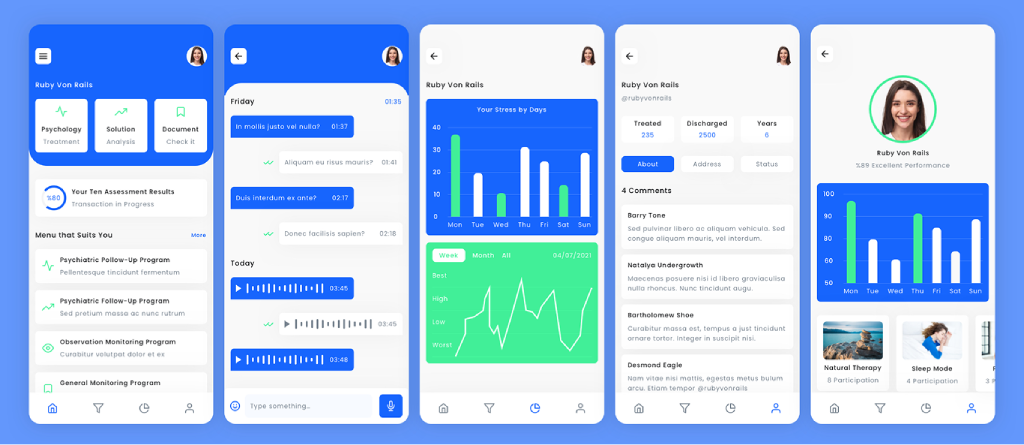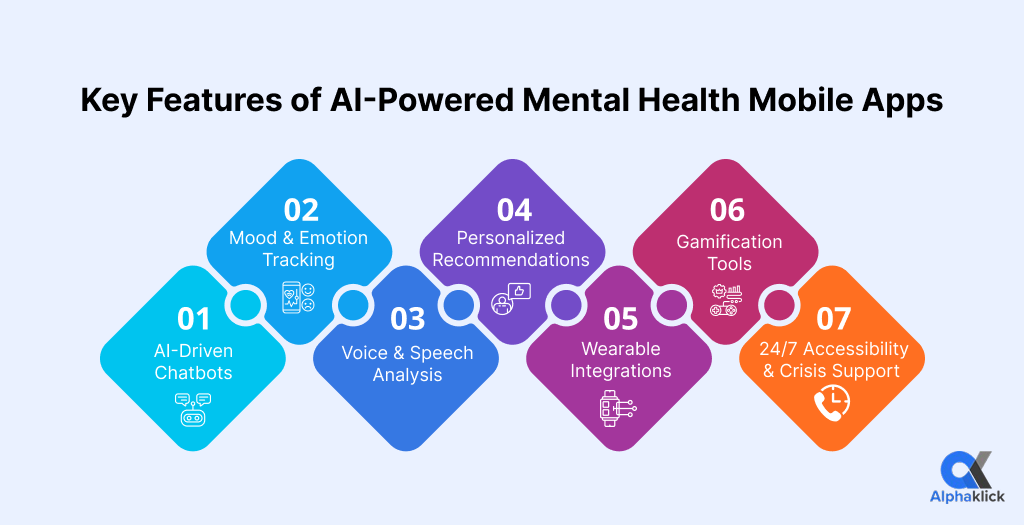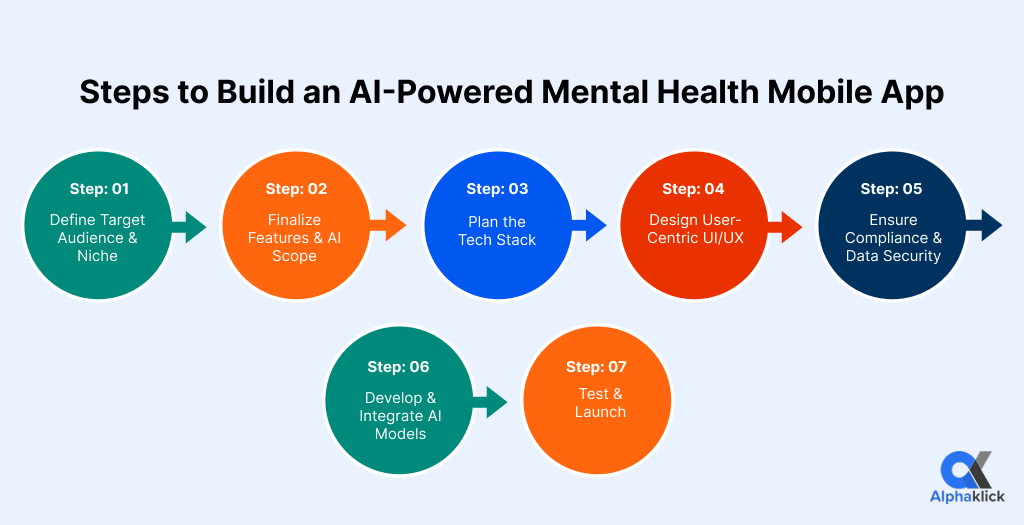Table of Contents
ToggleThe cost to build an AI-powered mental health mobile app in 2026 starts at roughly $40,000 for a basic version and can easily cross $200,000 for a full-scale solution packed with advanced AI features like emotion detection, predictive analytics, and therapy chatbots.
When I look at how fast the digital healthcare space is evolving, it’s clear we are standing in the middle of a mental health revolution. What once required scheduled therapy sessions is now available in your pocket: AI chatbots that listen, apps that track your emotions daily, and personalized wellness journeys powered by data.
And the numbers tell the same story. Fortune Business Insights predicts that the global mental health mobile app market will surge from $7.48 billion in 2026 to $23.80 billion by 2032, growing at a rapid 18% CAGR.
In other words, the demand is not just rising, it’s exploding.
That’s why I have put together this AI mental health mobile app development guide. Inside, I will break down the true costs, the must-have mental health mobile app features for 2026, monetization strategies, and a step-by-step roadmap.
By the end, you will know exactly how to structure your mental health mobile app development budget and build a product that stands out in 2026.
After learning how to build an AI-powered mental health mobile app: features and cost, you may also want to explore a professional Mobile App Development Company in Jaipur for tips on developing apps that are both effective and cost-efficient.
What is an AI-Powered Mental Health Mobile App?

An AI-powered mental health mobile app uses technologies like machine learning, NLP, sentiment analysis, and predictive analytics to deliver personalized emotional support and therapy-like experiences.
Popular examples include:
- Headspace: A mindfulness and meditation mobile app that uses AI to personalize guided sessions.
If you want to build a similar mobile app and want to know the mobile app development cost then you can explore our detailed guide on How Much Does It Cost to Build a Mental Health Mobile App Like Headspace?
- Calm: A leading wellness mobile app offering AI-driven sleep stories, relaxation techniques, and stress management tools.
- Meditopia: An AI-powered mental wellness mobile app that provides custom meditation and therapy-inspired practices.
Unlike traditional mobile apps, these platforms adapt to each user’s mood, tone, and habits. With the right budget for mental health mobile app development, businesses can tap into this rapidly growing market.
Cost of Developing an AI-Powered Mental Health Mobile App in 2026
Whenever I discuss AI mental health mobile app development cost with clients, one thing becomes clear: there’s no one-size-fits-all answer.
The price depends on how ambitious your vision is. Do you want a simple chatbot MVP? Or a full-scale AI-powered mental wellness mobile app with predictive analytics, emotion recognition, and integrations with wearables?
Key cost factors AI mental health mobile app:
- Features & AI Complexity: More advanced AI (like sentiment analysis or voice AI) means higher cost.
- Platform Choice: iOS, Android, or cross-platform makes a big difference.
- Compliance & Security: HIPAA/GDPR requirements add extra layers of cost.
- Team Expertise: Experienced AI developers, psychologists, and UI/UX designers raise quality (and price).
Want to create your own Calm-like app? Read our full guide: How to Build a Mental Health Mobile App Like Calm.
Estimated Cost Breakdown (Basic, Mid-Level, Advanced App)
| App Type | Key Inclusions | Estimated Cost (USD) | Timeline |
| Basic MVP | Simple chatbot, mood tracking | $40,000 – $60,000 | 3–4 months |
| Mid-Level App | AI chatbots, analytics, and wearable integration | $70,000 – $120,000 | 5–7 months |
| Advanced AI App | Sentiment analysis, voice AI, real-time monitoring | $150,000 – $250,000+ | 8–12 months |
A mental health chatbot mobile app cost may fall under $60,000, while an advanced AI mental health mobile app cost can easily cross $200,000, depending on customization.
Cost by Platform Choice
| Platform | Development Cost (USD) |
| iOS Only | $35,000 – $80,000 |
| Android Only | $30,000 – $75,000 |
| Cross-Platform (Flutter/React Native) | $60,000 – $140,000 |
If you are on a tighter mental health mobile app development budget, cross-platform frameworks are often the sweet spot.
Ongoing Maintenance & Other Costs
| Cost Type | Estimated Annual Cost (USD) |
| AI Model Training & Updates | $10,000 – $30,000 |
| Server & Hosting Costs | $5,000 – $15,000 |
| Compliance & Security Audits | $8,000 – $20,000 |
| Bug Fixes & Feature Enhancements | $15,000 – $40,000 |
| Marketing & User Acquisition | $20,000 – $100,000+ |
Most founders only think about AI therapy mobile app development cost during build-out, but the AI mental health mobile app cost by feature + ongoing updates often doubles the total investment over 2–3 years.
Key Takeaway
Your AI mental health mobile app pricing breakdown isn’t just about building once and launching. It’s about preparing for a long-term journey, building, maintaining, scaling, and staying compliant.
That’s why smart founders budget not just for mobile app development but also for ongoing success.
If your focus is on healthcare solutions, here’s a detailed breakdown of how much it costs to develop a healthcare mobile app in India.
Key Features of AI-Powered Mental Health Mobile Apps
Choosing the right AI-powered mental wellness mobile app features is what separates a basic app from one that truly impacts lives.
In 2026, users expect their mobile apps not only to guide them but also to understand, adapt, and respond to their unique emotional state.
Let’s break it down:
1. AI-Driven Chatbots
Gone are the days of static FAQs. AI chatbots provide real-time, empathetic conversations, offering comfort when users feel low and guiding them through CBT (Cognitive Behavioral Therapy) techniques.
These bots use NLP and sentiment analysis to pick up on mood changes, making the experience feel closer to talking with a human therapist.
2. Mood & Emotion Tracking
Mental health is not measured in a single moment; it’s about patterns. Daily mood journaling, emotion recognition via text or emojis, and AI-generated mood graphs help users and clinicians see progress (or warning signs) over time.
This data-driven approach makes interventions more timely and effective.
3. Voice & Speech Analysis
The way we speak reveals stress, anxiety, or depression markers. By analyzing tone, pitch, and pace, voice AI can detect emotional distress even when users don’t say it outright.
This proactive feature helps catch early signs of burnout or depression.
4. Personalized Recommendations
Every individual’s mental health journey is unique. AI can analyze user habits and provide custom suggestions, guided meditation, breathing exercises, stress management tips, or CBT-based micro-tasks.
These personalized nudges increase mobile app engagement and build healthier daily routines.
5. Wearable Integrations
Smartwatches and fitness bands generate valuable health data. By syncing heart rate, sleep quality, and activity levels, the mobile app gets a holistic picture of mental wellness.
For example, a sudden drop in sleep patterns might trigger a gentle AI reminder for stress management exercises.
6. Gamification Tools
Staying consistent with mental wellness is tough. That’s why gamification, rewards, challenges, and streaks keep users motivated.
Think “7-day meditation streak” or “unlocking badges” for completing CBT tasks. It makes progress fun and measurable.
7. 24/7 Accessibility & Crisis Support
Mental health doesn’t follow business hours. Users expect round-the-clock access, whether it’s through an AI chatbot at 2 AM or emergency crisis helplines integrated into the app.
This builds trust and ensures users feel supported at all times.
In short, mental health app features in 2026 are not just about functionality; they’re about creating an empathetic, adaptive, and motivating experience.
Mobile apps that combine these AI-powered mental wellness app features with a smooth UX will be the ones people keep using daily.
For a broader view of how features impact cost, check out our guide on Top health monitoring mobile app features and their development cost in 2026.

AI Technologies Behind Mental Health Mobile Apps
To build a powerful and reliable AI therapy mobile app, you need the right mix of technologies. Each AI component plays a unique role in delivering personalized, empathetic, and data-driven mental health support.
Below is the table that shows you the core AI technologies driving modern mental health mobile app development.
| AI Technology | Function in Mental Health Apps |
| Natural Language Processing (NLP) | Powers AI chatbots to hold natural, empathetic conversations with users. |
| Sentiment Analysis | Detects emotions in user text or speech (happy, anxious, stressed). |
| Predictive Analytics | Forecasts behavioral trends and mental health risks using historical data. |
| Machine Learning Models | Personalizes recommendations (meditations, CBT tips, routines). |
| Computer Vision | Uses facial recognition to detect emotional cues and stress indicators. |
By understanding these technologies, founders can align their mental health mobile app development budget with the features that truly matter, avoiding unnecessary costs and focusing on user impact.
The influence of these technologies extends beyond wellness. Discover how AI is taking over healthcare mobile apps to see the bigger picture.
Steps to Build an AI-Powered Mental Health Mobile App
Building an AI-powered mental health mobile app isn’t just about coding; it’s about creating a safe, empathetic, and effective companion for users.
Here’s a more detailed AI mental health mobile app development guide:
1. Define Target Audience & Niche
Duration: 3–4 weeks
Decide who you are building for. Are you targeting general users seeking meditation and stress relief, corporate wellness programs that want to support employees, or clinical therapy mobile apps designed for healthcare professionals and patients?
This choice will shape everything, including features, compliance requirements, and overall cost.
2. Finalize Features & AI Scope
Duration: 2–3 weeks
Not every mobile app needs every feature. For a startup MVP, you may only need chatbots and mood tracking.
For a premium app, you may want voice AI, predictive analytics, and wearable integrations. The right feature mix defines both the AI mental health mobile app development cost and the long-term adoption rate.
3. Plan the Tech Stack
Duration: 2–3 weeks
Choose the right technologies. You will need AI models for chatbots and emotion detection, backend infrastructure for storing sensitive data, and mobile frameworks such as native iOS/Android or cross-platform Flutter/React Native.
A well-planned stack ensures scalability and prevents ballooning costs later.
4. Design User-Centric UI/UX
Duration: 4–6 weeks
Mental health mobile apps aren’t about flashy design; they are about comfort and trust. Focus on calm color palettes, simple navigation, and intuitive interactions.
A cluttered interface can increase stress instead of reducing it, so minimalism and clarity are essential.
5. Ensure Compliance & Data Security
Duration: 2–4 weeks
Handling user mental health data comes with responsibility. Compliance with HIPAA, GDPR, or local healthcare regulations is non-negotiable.
While this step may increase the mental health mobile app development budget, it builds trust and prevents legal risks.
6. Develop & Integrate AI Models
Duration: 8–12 weeks
This is where the mobile app comes alive. AI chatbots require NLP training, mood trackers need predictive models, and wearable integrations require real-time syncing.
Continuous retraining of AI models is essential so the mobile app remains accurate and empathetic.
7. Test & Launch
Duration: 3–4 weeks
Before launch, conduct extensive QA testing, both technical (bugs, performance) and psychological (ensuring chatbot responses are safe and empathetic).
After release, gather user feedback and push updates regularly to improve engagement and trust.
For detailed benefits of AI in mobile apps, visit our blog on How AI Benefits Mobile Apps in Various Industries.

Monetization Strategies for Mental Health Mobile Apps
Developing an app is only the beginning; the real challenge is ensuring it remains sustainable and profitable over time. A strong monetization strategy not only covers your mental health mobile app development budget but also keeps the app financially healthy as it scales.
Here are the most effective strategies:
1. Subscription Model (Monthly/Annual)
The most common approach, where users pay a recurring fee for access to premium features like advanced meditations, AI-driven therapy sessions, or personalized reports.
This creates a steady cash flow and works especially well if your mobile app offers continuous value.
2. Freemium + In-App Purchases
Offer basic features for free, while locking advanced tools (like AI emotion tracking, personalized therapy plans, or exclusive content) behind paywalls.
This lowers the entry barrier, attracts more users, and nudges them toward paid upgrades once they see value.
3. Partnerships with Healthcare Providers
Many insurance companies and clinics are integrating digital health tools into their plans. By partnering with healthcare providers, your mobile app can become part of treatment programs, with costs covered by insurers.
This approach adds credibility and scales user adoption quickly.
4. Corporate Wellness Programs
Employee mental health is a priority for organizations worldwide. Selling bulk subscriptions to companies as part of their wellness initiatives can provide a stable, large-scale revenue stream.
This model also positions your mobile app as a B2B solution, not just a consumer product.
5. Ethical Advertising
While ads should be used carefully in mental health mobile apps, well-curated, non-intrusive advertising (such as partnerships with wellness brands or book publishers) can generate additional revenue.
The key is to ensure ads feel supportive, not disruptive, to the user’s journey.
Partner with AlphaKlick to Build a Mental Health Mobile App
Building an AI-powered mental health mobile app isn’t just about features and cost; it’s about creating a product that truly makes a difference in people’s lives. That’s where AlphaKlick comes in.
We are not just another React Native mobile app development company in India. With 9+ years of experience, we have helped startups, healthcare providers, and enterprises bring powerful, user-friendly, and compliant apps to life.
We have been consistently ranked among the Top mobile app development companies in India, trusted by startups and enterprises alike.
Here’s why teams trust us:
- Expertise in AI & ML: From empathetic chatbots to predictive analytics, we know how to turn ideas into scalable AI solutions.
- Healthcare Compliance First: Every app we build is HIPAA/GDPR-ready, ensuring user trust and data security.
- Custom-Built Features: Whether it’s a simple MVP or an advanced AI-powered mental wellness mobile app, we design for your exact needs.
- End-to-End Partnership: From brainstorming to development, launch, and long-term scaling, we stay with you at every step.
If you are exploring the cost to build an AI-powered mental health mobile app, our team will give you a clear AI mental wellness mobile app price estimate and a roadmap that fits your vision and budget.
Ready to take the next step? Book a free consultation with us today, and let’s build something meaningful together.
Frequently Asked Questions (FAQ)
1. How to create a mobile app for mental health?
You’ll need to define your audience, finalize features, design UI/UX, ensure compliance, and integrate AI models.
2. What is the most used mental health mobile app?
Apps like Calm, Headspace, and Wysa are among the most widely used globally.
3. How long does it take to develop a mental health mobile app?
On average, 5–8 months, depending on features and AI complexity.
4. How much does it cost to build an AI mental health mobile app?
The AI mental health mobile app cost by feature varies. A basic mobile app might cost $40,000–$60,000, while an advanced AI mental health mobile app can cost exceed $200,000.

